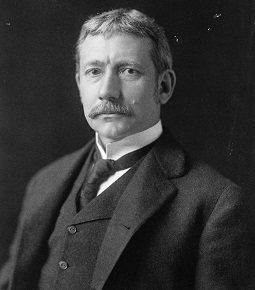
Word of the Day: Pivotal
Paul Schleifer
According to the OED, pivotal means, “Of, relating to, or acting as a pivot; being that on which anything turns or depends; central, crucial, vital.” So, what’s a pivot? Again, according to the OED, pivot means, “A short shaft or pin, usually of metal and pointed, forming the centre on which a mechanism turns or oscillates, as the pin of a hinge, or the end of an axle or spindle; a fulcrum. Also gen.: any physical part on which another part turns.” But the OED gives a second, figurative meaning: “The crucial or central point of something; that on which everything depends.”
Pivot comes into the language around 1610, from French pivot “hinge pin.” But pivotal doesn’t appear until 1844.
On this date in 1913, a pivotal (in the figurative sense) event occurred in the U.S. That is when the legislature of Connecticut ratified the 17th amendment to the U.S. Constitution. Connecticut’s vote was the one that made the amendment law, though it was not certified by Secretary of State William Jennings Bryan until May 31.
Prior to the 17th amendment, the two senators from each state were chosen by that state’s legislature. Advocates for the 17th amendment complained that the Senate was, because of this promise, corrupt, that those who became senators traded favors. A Wikipedia article describes the concern thus: “There was a sense that senatorial elections were ‘bought and sold’, changing hands for favors and sums of money rather than because of the competence of the candidate. Between 1857 and 1900, the Senate investigated three elections over corruption. In 1900, for example, William A. Clark had his election voided after the Senate concluded that he had bought votes in the Montana legislature. But analysts Bybee and Todd Zywicki believe this concern was largely unfounded; there was a “dearth of hard information” on the subject. In more than a century of legislative elections of U.S. senators, only 10 cases were contested for allegations of impropriety” (https://en.wikipedia.org/wiki/Seventeenth_Amendment_to_the_United_States_Constitution#Background).
So the purpose of the 17th amendment, a bill sponsored by the Populist Party, among others, was to make the election of senators more fair. It was supported by William Jennings Bryan, a strong progressive, and by William Randolph Hearst, one of the inventors of yellow journalism. The Wiki says further, “Bryan and the reformers argued for popular election through highlighting perceived flaws with the existing system, specifically corruption and electoral deadlocks, and through arousing populist sentiment. Most important was the populist argument; that there was a need to ‘Awaken, in the senators…a more acute sense of responsibility to the people,’ which it was felt they lacked; election through state legislatures was seen as an anachronism that was out of step with the wishes of the American people, and one that had led to the Senate becoming ‘a sort of aristocratic body – too far removed from the people, beyond their reach, and with no special interest in their welfare.’”
But the sad truth is that the 17th amendment did just the opposite of what its supporters claimed it would do. Given that most people in most states have absolutely no chance of ever meeting their senators, they have actually lost control over who sits in the Senate. Before, when the senators were chosen by the state legislature, the people had quite a bit more control because a voter can actually meet a member of the state legislature. A voter can put pressure on their state representatives if they feel that the chosen senators are not representing the interests of the state. And far from the senators becoming close to the people, they are more and more an aristocracy, far above the people they supposedly represent.
In addition, senators now vote to increase their own power by increasing the power of the federal government over and against the power of the state government. The result has been that since the passing of the 17th amendment, the federal government has become ever more powerful, while the state governments have become less and less significant to the lives of Americans. Just think of it: do you know who your state senator or representative is? Do you know what bills of significance are currently being considered by your state legislature? Do you care?
The passing of the 17th amendment was a pivotal event in the history of the United States.
Today’s image is a 1902 photograph of Elihu Root, a U.S. Senator, and Secretary of State under Theodore Roosevelt and Secretary of War under Roosevelt and William McKinley. He was also an opponent of the 17th amendment.